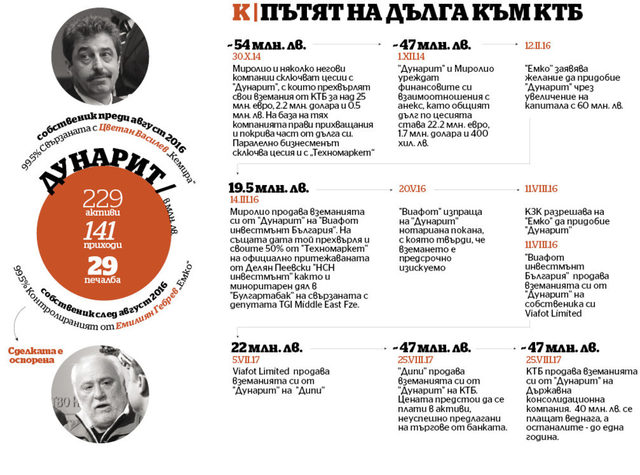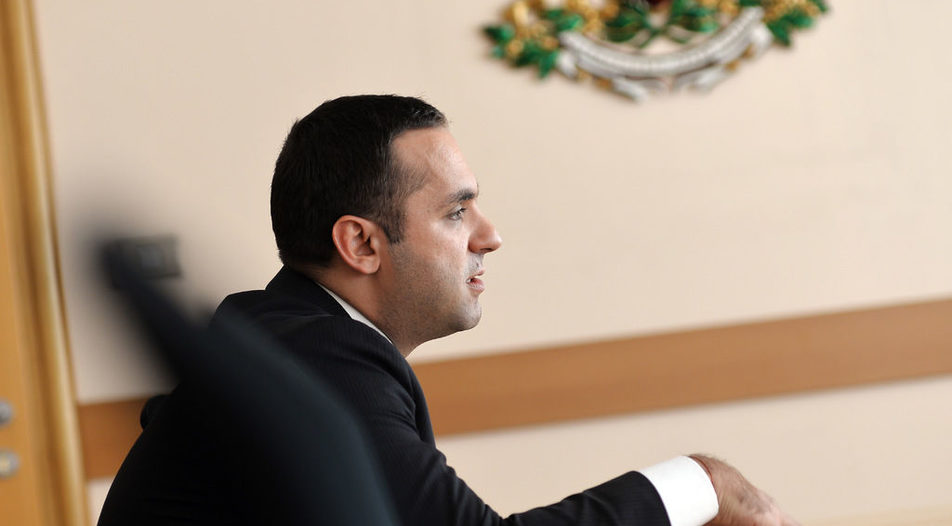• There is no definitive proofs that Delyan Peevski is behind the attack, but all players conspicuously employ the same tactics used the infamous MP.
It is a booming period for the Bulgarian armaments industry. As armed conflicts in the Middle East - a traditional market for Bulgarian arms exports since the days of Socialist camaraderie - show no signs of abating, the factories for light armament and ammunition expand their production exponentially. All of the large weapons producers in Bulgaria, both private and state-owned, have been enjoying astounding growth of profits and the numbers of people employed and export contracts signed.
This is why it came as a huge surprise when Economy Minister Emil Karanikolov announced in the last days of August that the ministry was launching an urgent attempt to actually nationalize ammunition manufacturer Dunarit based in Ruse, in northeastern Bulgaria. The timing was strange as the previously struggling company had reported a surge in revenues and a net profit of 29 million levs for 2016 and employed 1300 workers at the time of the announcement.
Dunarit is among the last tangible assets of Bulgaria's bankrupt Corporate Commercial Bank (Corpbank). Most of the other valuable assets were plundered by some of the former business partners of Tsvetan Vassilev, the disgraced former owner of Corpbank, who is living in exile in Serbia. The ammunition producer had been skillfully transferred to new owners before the trustees of Corpbank were able to take control over it. However, a new entity claiming ownership miraculously appeared: an offshore company which conspicuously employs the same raiding tactics used by Delyan Peevski, the infamous MP from the Movement for Rights and Freedoms (DPS) owner of large businesses and a media mogul. Now, it seems, the state is yet again siding with Mr. Peevski. Prime Minister Boyko Borissov has publicly declared that the government is not helping Mr. Peevski but the denial was not very convincing.
The state taking sides
Although Mr. Karanikolov was careful not to use the term "nationalization" and only talked about acquiring the debt of 67million levs Dunarit had accumulated, he made it clear that the state plans to kick in to prevent an insolvency procedure or a sale of the ammo factory and to "preserve the company and the jobs".
"I guarantee this will happen", Mr. Karanikolov stated during an emergency press conference on August 28.
But under the guise of saving the company from insolvency and 5000 jobs (according to Mr Karanikolov's statement) from being lost, the government seems to be playing a secret game. Before the Ministry of Economy announced its plans to buy Dunarit's debt, two firms were battling in court to gain control over the ammunition manufacturer.
One of them, EMKO is a Bulgarian ammunition producer with manufacturing facilities in Tryavna and Belitsa. It acquired Dunarit in early 2016 from companies related to Mr. Vassilev and later declared that it intends to repay Dunarit's outstanding debt to Corpbank, depriving the bank trustees of claim.
The other one, Viafot Investment Bulgaria, is an offshore company with alleged links to Mr. Peevski. With court action on ownership of Dunarit drawing to a close not in favor of Viafot, the government intervened. This has been the pattern with most of Mr. Peevski's undertakings that are based on good political connections, rather than on unique business acumen.
Attacks against Dunarit came from many fronts in the last few months. EMKO got its manufacturing license suspended by the authorities in July over non-compliance with regulations for storage of hazardous materials. Even though the company declared that it had taken all measures to comply with the regulations before the end of August, its license has not been restored by September 13. While it took two days to withdraw the license its recovery is taking conspicuously longer.
The second front was opened by the state prosecution office when it indicted three of the board members of Dunarit for embezzling company profits and transferring them to the Tsvetan Vassilev in Belgrade. Based on these charges, which has nothing to do with arms trade, the state suspended Dunarit's export license as well. Although the indicted board members swiftly resigned, the export license remained suspended .
According to an investigation of Corpbank assets carried out by the bankruptcy trustees in February, an offshore company owned by Mr. Vassilev (EFV International Financial Ventures) was the final link in the chain of firms that had controlled Dunarit for a 'long period of time'. Due to the charges against the board members and the uncertainty surrounding the ownership of Dunarit that prevented changes in the management, Mr. Karanikolov claimed the state needs to kick in and prevent damage to systemically important arms producers.
With the press conference of Mr. Karanikolov about to follow on August 28, a request to register the State Consolidation Company (SCC) as the pledgeholder of loans to Dunarit was submitted to the Commercial Register. From these documents, Capital newspaper found out that the SCC, under the governance of Mr. Karanikolov, had bought the largest chunk of the debt owed by Dunarit - 47 million levs - via a complex network of debt transfers (cessions), linked to Edoardo Miroglio and Viafot Investment Bulgaria and the bankrupt Corpbank itself.
A couple of days later, however, the management of Dunarit surprisingly announced that it is paying off chunk of its debt owed to Corbank (50 million levs), effectively blocking the state's acquisition attempt. The CEO of the company, Krastyo Krastev told public TV channel BNT the following day that the Sofia City Court had stood behind the management's demand to stop the acquisition and that he will make sure that the rest of the debt - around 17 million levs - will be repaid at a later date.
Mr. Peevski always somehow wins

Tsvetan Vassilev commented from Belgrade that the move to nationalize Dunarit "is a criminal act". He described the attempt as a combined action of the Bulgarian government and the state prosecution ordered for the benefit of his former business partner Mr. Peevski. Talking to the Sofia-based private TV channel BiT, he called the Dunarit case an "organized crime with the participation of civil servants".
Mr. Peevski himself denied that he "has, or has ever had, or will ever have any connection to any of the companies linked to the arms industry, including Dunarit", in a rare public statement sent out to media outlets owned by him.
Prime Minister Boyko Borissov closed off debate in a televised interview in mid-September, saying "The company will never get into [Delyan Peevski's] hands".
Of course, offshore company Viafot was able to recover all the money Dunarit allegedly owed it. The benefactor was the state with the crucial role of no other than the Minister of Economy. Even though there is no definitive proof that Mr. Peevski is behind Viafot, in his previous capacity of CEO of the government's Privatization Agency Mr. Karanikolov had been involved in other deals that benefited Mr. Peevski in the end.
The way state institutions created the Dunarit case and reacted to it is just another example how oligarchic ties set the agenda of the third government of Bulgaria led by Mr. Borissov.
• There is no definitive proofs that Delyan Peevski is behind the attack, but all players conspicuously employ the same tactics used the infamous MP.












